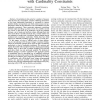Free Online Productivity Tools
i2Speak
i2Symbol
i2OCR
iTex2Img
iWeb2Print
iWeb2Shot
i2Type
iPdf2Split
iPdf2Merge
i2Bopomofo
i2Arabic
i2Style
i2Image
i2PDF
iLatex2Rtf
Sci2ools
ICDE
2012
IEEE
2012
IEEE
Aggregate Query Answering on Possibilistic Data with Cardinality Constraints
— Uncertainties in data arise for a number of reasons: when the data set is incomplete, contains conflicting information or has been deliberately perturbed or coarsened to remove sensitive details. An important case which arises in many real applications is when the data describes a set of possibilities, but with cardinality constraints. These constraints represent correlations between tuples encoding, e.g. that at most two possible records are correct, or that there is an (unknown) one-to-one mapping between a set of tuples and attribute values. Although there has been much effort to handle uncertain data, current systems are not equipped to handle such correlations, beyond simple mutual exclusion and co-existence constraints. Vitally, they have little support for efficiently handling aggregate queries on such data. In this paper, we aim to address some of these deficiencies, by introducing LICM (Linear Integer Constraint Model), which can succinctly represent many types of tuple...
Related Content
| Added | 28 Sep 2012 |
| Updated | 28 Sep 2012 |
| Type | Journal |
| Year | 2012 |
| Where | ICDE |
| Authors | Graham Cormode, Divesh Srivastava, Entong Shen, Ting Yu |
Comments (0)

